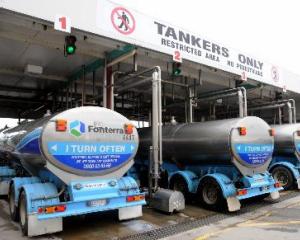
The dairy giant appears to have bowed to a week of public pressure and claims that rising milk prices made the food staple unaffordable for some families.
Fonterra chief executive Andrew Ferrier yesterday announced that despite it costing millions of dollars, its subsidiary Fonterra Brands would absorb any further price rises for the rest of this year.
Mr Ferrier said international dairy prices, which influenced the price Fonterra Brands paid for milk, had risen 26% in the past three months, but despite that it had only passed on a 1.4% price rise to its retail customers.
Absorbing these and earlier price rises had cost Fonterra Brands $10 million so far.
"We recognise milk is an important part of the diet in New Zealand and we want to ensure that future generations of New Zealanders grow up enjoying it every day," he said.
But, ultimately retailers, such as supermarkets, set the price and would dictate whether consumers benefited from the price freeze.
"It would be great to see retailers getting in behind this commitment for the benefit of New Zealand consumers."
Food prices were coming under increasing pressure with growing demand from Asian and Middle Eastern countries, and Mr Ferrier said it was an issue that was here to stay.
"Looking forward, global food prices are expected to remain strong. This is not just an issue for dairy or just an issue for New Zealand," he said.
Fonterra Brands and Australian-owned Goodman Fielder are the two largest suppliers of dairy products to the New Zealand market.
Goodman Fielder was asked if it, too, would hold its prices, but no response had been received.
Meanwhile, Agriculture Minister David Carter has asked his officials for a briefing on domestic dairy pricing but has ruled out introducing government subsidies.
"I think they've acknowledged the public concern about increasing milk prices ... They have recognised the impact it's having, particularly on low-income New Zealanders, so I congratulate Fonterra for doing it," Mr Carter said.
"As an export nation reliant on the international price for many goods, we have to accept that at times of high prices ... the New Zealand economy will do well, but the adverse effect will be that it will cost New Zealanders more," he said.
New Zealand Food and Grocery Council chief executive Katherine Rich welcomed the decision, while at the same time criticising "misleading assertions that milk has somehow become a luxury item".
"This is a big financial commitment by Fonterra and we hope other Kiwis have some understanding and appreciation of just how significant this decision is," Mrs Rich said.
"At the same time, it is important to correct some misleading assertions that milk has somehow become a luxury item in New Zealand."
She said figures collected by the Department of Statistics showed that in "real dollar terms" milk was actually cheaper than it was 10 years ago.
"I know that this goes against the sense that many Kiwis have about rising costs, but price increases never occur in an economic vacuum."
- Additional reporting NZPA






